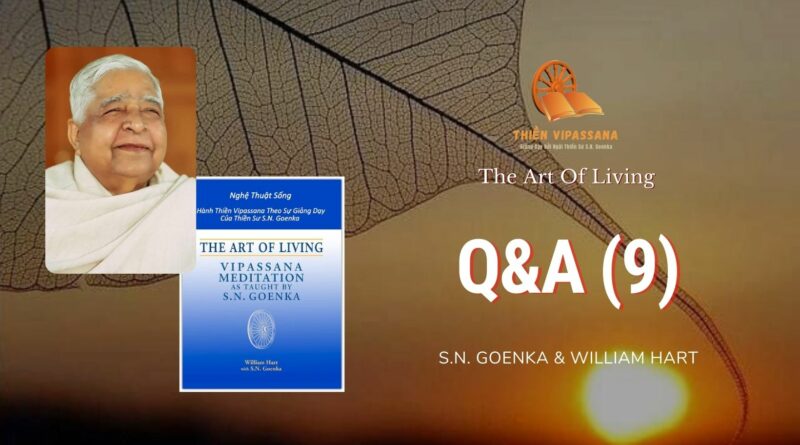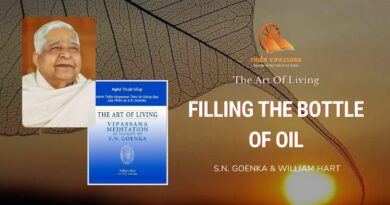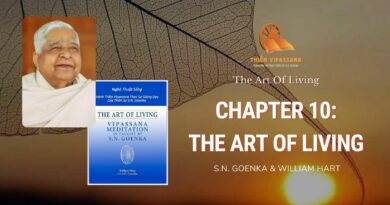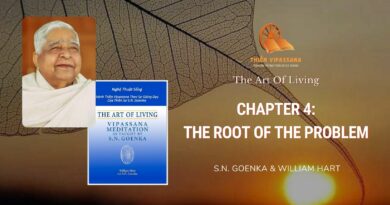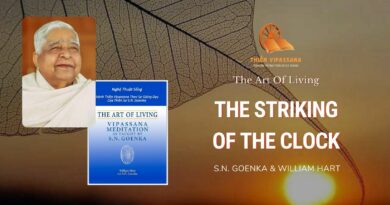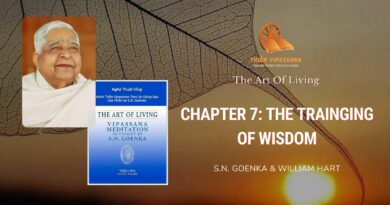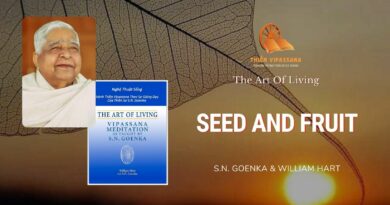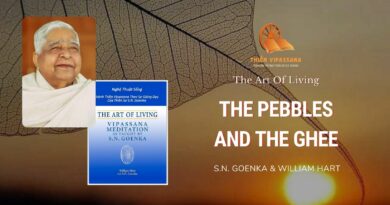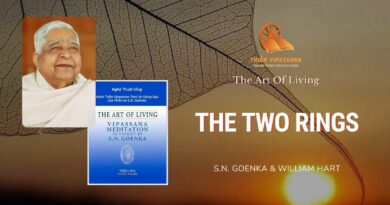Questions and Answers
QUESTION: I wonder whether we can treat obsessive thoughts in the same way that we treat physical pain.
N. GOENKA: Just accept the fact that there is obsessive thought or emotion in the mind. It is something that was deeply suppressed and now has appeared at the conscious level. Do not go into the details of it. Just accept emotion as emotion. And along with it, what sensation do you feel? There cannot be an emotion without a sensation at the physical level. Start observing that sensation.
Then do we look for the sensation related to that particular emotion?
Observe any sensation that occurs. You cannot find which sensation is related to the emotion, so never try to do that; it is indulging in a futile effort. At a time when there is emotion in the mind, whatever sensation you experience physically has a relation to that emotion. Just observe the sensations and understand, “these sensations are anicca. This emotion is also anicca. Let me see how long it lasts.” You will find that you have cut the roots of the emotion and it passes away.
Would you say that emotion and sensation are the same?
They are two sides of the same coin. Emotion is mental and sensation is physical, but the two are interrelated. Actually every emotion, anything that arises in the mind, must arise along with a sensation in the body. This is the law of nature.
But emotion itself is a matter of the mind?
A matter of the mind, surely.
But the mind is also the whole body?
It is closely related to the entire body.
Consciousness is in all the atoms of the body?
Yes. That is why sensation related to a particular emotion can arise anywhere within the body. If you observe sensations throughout the body, you are certainly observing the sensation related to that emotion. And you come out of the emotion.
If we are sitting but not able to feel any sensation, is there still any benefit in the practice?
If you sit and observe respiration, it will calm and concentrate the mind, but unless you feel sensation, the process of cleansing cannot work at the deeper levels. In the depths of the mind, reactions start with sensation, which occurs constantly.
During daily life if we have a few moments, is it helpful to be still and observe sensations?
Yes. Even with open eyes, when you have no other work, you should be aware of the sensations within you.
How does a teacher recognize that a student has experienced nibbāna?
There are various ways to check at the time when someone is actually experiencing nibbāna. For this a teacher must be properly trained.
How can meditators know for themselves?
By the change that comes in their lives. People who have really experienced nibbāna become saintly and pure-minded. They no longer break the basic five precepts in any major way, and instead of concealing a mistake, they admit it openly and try hard not to repeat it. Clinging to rituals and ceremonies drops away, because they recognize them as only external forms, empty without the actual experience. They have unshakable confidence in the path that led them to liberation; they do not continue to search for other ways. And finally, the illusion of ego will be shattered in them. If people claim to have experienced nibbāna but their minds remain as impure and their actions as unhealthy as before, then something is wrong. Their way of life must show whether they have really experienced it.
It is not appropriate for a teacher to issue “certificates” to students— to announce that they have attained nibbāna. Otherwise it becomes an ego-building competition for teacher and for students. The students strive only to get a certificate, and the more certificates a teacher issues, the higher is his reputation. The experience of nibbāna becomes secondary, the certificate takes primary importance, and it all becomes a mad game. Pure Dhamma is only to help people and the best help is to see that a student really experiences nibbāna and becomes liberated. The whole purpose of the teacher and the teaching is to help people genuinely, not to boost their egos. It is not a game.
How would you compare psychoanalysis and Vipassana?
In psychoanalysis you try to recall to consciousness past events that had a strong influence in conditioning the mind. Vipassana, on the other hand, will lead the meditator to the deepest level of the mind where conditioning actually begins. Every incident that one might try to recall in psychoanalysis has also registered a sensation at the physical level. By observing physical sensations throughout the body with equanimity, the meditator allows innumerable layers of conditioning to arise and pass away. He deals with the conditioning at its roots and can free himself from it quickly and easily.
What is true compassion?
It is the wish to serve people, to help them out of suffering. But it must be without attachment. If you start crying over the suffering of others, you only make yourself unhappy. This is not the path of Dhamma. If you have true compassion, then with all love you try to help others to the best of your ability. If you fail, you smile and try another way to help. You serve without worrying about the results of your service. This is real compassion, proceeding from a balanced mind.
Would you say that Vipassana is the only way to reach enlightenment?
Enlightenment is achieved by examining oneself and eliminating conditioning. And doing this is Vipassana, no matter what name you may call it. Some people have never even heard of Vipassana, and yet the process has started to work spontaneously in them. This seems to have happened in the case of a number of saintly people in India, judging from their own words. But because they did not learn the process step by step, they were unable to explain it clearly to others. Here you have the opportunity to learn a step-by-step method that will lead you to enlightenment.
You call Vipassana a universal art of living, but won’t it confuse people of other religions who practise it?
Vipassana is not a religion in disguise that is in competition with other religions. Meditators are not asked to subscribe blindly to a philosophical doctrine; instead they are told to accept only what they experience to be true. It is not the theory but the practice that is most important, and that means moral conduct, concentration and purifying insight. What religion could object to that? How could it confuse anyone? Give importance to the practice, and you will find that such doubts are automatically resolved.
Bài viết này được trích từ cuốn sách The Art Of Living – Thiền Sư S.N.Goenka và William Hart.

